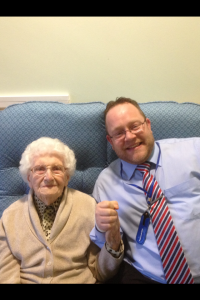Dad is also concerned a hearing aid would spoil the hearing he still had left, because it would feed back or amplify really loud sounds. I admit, I had wondered about that too.
Modern hearing aids have made great strides. Digital technology allows the hearing aid to monitor and control sound levels. Devices are programmed to cut off at unsafe levels and control feedback as well as isolate specific sounds, making it easier to hear in a crowded room for example.
Wait Not, Want Not
If my father continues to avoid dealing with his hearing loss, the neurological components of his hearing that function properly may atrophy at an accelerated rate. It’s called auditory deprivation.
Reams of studies have been conducted on sound deprived children, adults, and unfortunate baby rats. Google it.
“When you have a hearing loss, you’re depriving the auditory system of the stimulation it needs to run efficiently,” Saunders says.
“The longer you leave a hearing loss untreated, the less efficient the system becomes. It [your brain] forgets how to process certain sounds.”
“Your 90- or 80-year-old self is really going to suffer for your decision at 70 to wait.”
Dad is worried a hearing aid will give him an ear infection. Today’s popular models, called open-fit hearing aids, don’t plug your ear completely. Air and sound enter the ear freely. There is little wax buildup, and you won’t feel like your voice is booming when you speak.
At nearly 74, my father is also concerned a hearing aid will make him look old. (It’s a perfectly legitimate concern for such a handsome guy.)
These days, the only visible part of an open fit hearing aid is a tiny, clear tube going into your ear. The largest part is hidden behind your ear.
“Those tiny hearing aids which tuck behind your ear have advanced technology with directional capabilities,” Saunders says.
There are also implantable hearing aids that stay in your ear for three months at a time. Others fit deep in your ear canal and are removed nightly.
“If somebody wants an inconspicuous hearing aid, we have a ton of options to show them.”
It seems there are several completely invisible options, and an added benefit, according to Saunders, is that “you will appear younger, [because] you’ll be part of the conversation again.”
Audiologists and hearing instrument specialists are health professionals
Here’s another common concern: If you go to get tested at a place that sells hearing aids, are you more likely to end up leaving with one?She objected to the idea that places that both test hearing and fit for hearing aids are doing more than offering a needed service.
“If you’re seeing an audiologist you’re seeing a health professional. Everybody has to have a master’s degree or equivalent,” Kealey says.
Fitting hearing aids is only a small part of what an audiologist does. You may also be tested and fitted by a hearing instrument specialist who is college-trained specifically in hearing aid technology.
The hearing clinics I spoke with use differing combinations of both. Professional conduct doesn’t appear to be the real issue.
“The biggest problem we have is getting people with serious hearing problems in the door for a test,” “Even if the problem is easy to solve, you’ll never know if you don’t get tested.”
‘Did Kleenex always make a sound?’
The key to a successful experience is working with professionals you feel comfortable with.
Improper device tuning during the fitting process can create unsatisfied customers. A skilled professional will be able to provide you with good results. “What makes the difference between a good hearing aid and a bad one is how it’s programmed.”
In the event that you need to go back a few times to get the programming or the fit just right, you need to feel confident you will get excellent service and all the time you need.
It is also important that people get assistance and counseling when acclimatizing to the change in their hearing.
Saunders says some clients have forgotten what the world really sounds like. Accustomed to living with hearing loss, they are not used to hearing natural sounds at normal levels. “They ask, ‘Did Kleenex always make a sound?’”
If you have any questions about the latest hearing aids and digital technology contact Hidden Hearing.
Source The Epoch Times: Read More>








